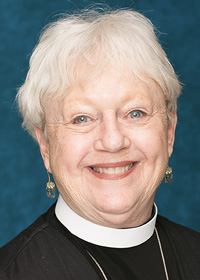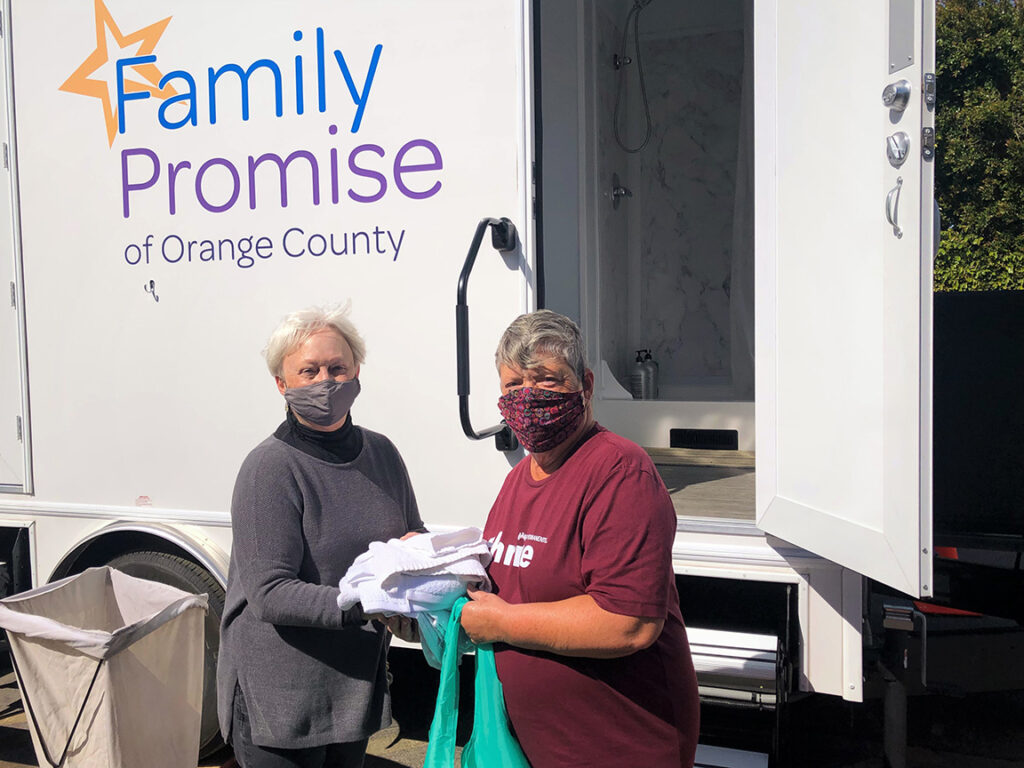
Laura Siriani
Whether feeding and offering showers to Tustin-area homeless persons or supporting refugees and asylees, the Rev. Laura Siriani’s approach is: “We’re all in this together. It’s all about relationship and knowing someone’s story. Once you know their story it becomes real and you recognize we’re the same people, just different circumstances.”
Siriani brings that conviction to her new role as archdeacon of the Episcopal Diocese of Los Angeles. Her first order of business “will be to get to know the deacons of the diocese better, to learn about their work and to talk to some parishes about the diaconate. I want other people in the diocese to know what amazing work they do. The world needs deacons,” she told the Episcopal News recently.
“Those who know Laura best talk about clarity,” said Bishop Diocesan John Harvey Taylor, in announcing Siriani’s appointment. “When she felt called to ordained ministry, it was immediately clear to her that God meant the diaconate. She is clear about the Christian’s obligation to those most at risk. She is clear, gracious, and loving in her teaching, preaching, and pastorship.
“Finally, she and I are clear about one thing above all: that the historic diaconate is an indispensable element of the future of an abundant Episcopal Church. Deacons are among our leading prophets to a secularizing time of the good news of Christ’s love, justice, and peace. I look forward to our ministry together as we pastor together to all our amazing deacons.”
Siriani succeeds the Rev. Charleen Crean, who retired Oct. 16, 2020. Her new title is “the Venerable Laura Siriani.”
Taylor said the archdeacon is responsible for supporting deacons in the fellowship of community and in their varying ministries, working with those discerning a call to the diaconate, and encouraging the unveiling of diaconal vocations by preaching and teaching about the Sacred Order of Deacons, often by visiting churches and other institutions. The archdeacon also serves at the altar during major diocesan liturgies such as ordinations and annual convention Holy Eucharist services.
Siriani’s role at St. Paul’s Church has evolved since she joined the Tustin church as a parishioner in 1989. She has served there as office assistant, as the welcome and communications coordinator and eventually as deacon, after the Rev. Kay Sylvester, rector, recognized her passion for justice and skills for “pulling people together and identifying their gifts.
“Here at St. Paul’s, she was instrumental in creating and leading our now 10-year-old Sunday Supper program,” Sylvester said. “Starting around Christmas of 2020, she brought a Sunday showers ministry to our campus for our Sunday Supper neighbors.”
Additionally, Siriani has been involved with countywide conversations about the crisis in unhoused people; she serves on a board gathered by the Sisters of St. Joseph that’s working on immigration issues. “Laura and I have been working together on a new non-profit that we hope is going to result in a drop-in day center for our unhoused neighbors in Tustin,” Sylvester added. “I fully expect Laura’s energy and joy to be a great asset to the ministry of the deacons in our diocese.”

Laura Siriani and her daughter Starla staff the portable shower at St. Paul’s Church, Tustin.
A lifetime of social action
The diaconate came naturally for Siriani, as deacons serve at the intersection between the world and church, although she doubts it would have occurred to her, had Sylvester not mentioned the opportunity.
“I was stunned,” Siriani recalled. “I don’t think, to this day, if she hadn’t asked the question, whether I’d have made all the steps to go through the process. I didn’t know enough about it and as I learned about it, I realized this was exactly where I was called. All those pieces from way back were falling into place – and that’s an important piece for people in the church, to recognize a call in someone else.”
Siriani, 73, recalled navigating within that intersection while growing up in segregated and unequal Greenville, Mississippi. “I never could figure out the disparity between what was said in church and what happened outside the church,” she said. ‘It didn’t make sense to me … and there was no role for women then.”
A cradle Episcopalian, she witnessed social change with the Civil Rights Movement, when the church, “with the encouragement of leaders like Martin Luther King, used its voice and I could see that, for the church both inside and outside, it was possible to live the Gospel.”
Later, married and raising two daughters, Siriani continued to live into that gap, actively engaging the community – “although we didn’t call it community organizing then” – while the family moved to Florida and later settled in California.
She is married to Bruce Siriani, a retired real estate broker and current property manager. They have two grown daughters, and three grandchildren.
Siriani retired after 20 years as a marketing associate in the corporate world when she began diaconal studies at Bloy House. She holds a bachelor’s degree in journalism and sociology from the Mississippi University for Women, and a certificate in diaconal studies from Bloy House. She was ordained a vocational deacon on May 21, 2017 and continues to serve as St. Paul’s welcome and communications coordinator.
As a partnership with Family Promise, the shower ministry seemed a natural extension to the church’s feeding program, which has continued through the pandemic, but with to-go instead of in-person meals. The program has been relocated temporarily while some church property is under construction.
Pre-pandemic, Family Promise, located in the city of Orange, partnered with churches to house families on a rotating basis. “They had a shower trailer they weren’t using, and we were storing it,” Siriani recalled. “They’re letting us use it. Once they go back to housing people, they will still let us use it on Sundays.”
That new ministry is one more reflection of the need for vocational deacons, whose profile and numbers she aims to raise within the diocese.
“I’m so proud to be part of this particular group,” she said. “Deacons in the diocese are amazing. Mostly, I want to get to hear their dreams about what they see going forward, and I want other people in the diocese to know what they do and to talk about what it means to be a deacon.
“We bridge that gap that was always there, that gap between the gospel and what’s going on outside the doors of the church. And the church’s role in bridging the gap between the Gospel and the world has never been more important.” Nor has the work of deacons, “who have a great story to tell.”
